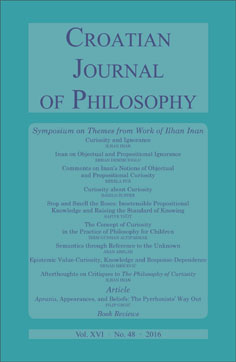Epistemic Value. Curiosity, Knowledge and Response-Dependence
Epistemic Value. Curiosity, Knowledge and Response-Dependence
Author(s): Nenad MiščevićSubject(s): Epistemology, Ethics / Practical Philosophy, Philosophy of Mind, Philosophy of Language
Published by: KruZak
Keywords: curiosity; belief; epistemic value;
Summary/Abstract: The paper addresses two fundamental issues in epistemic axiology. It argues primarily that curiosity, in particular its intrinsic variety, is the foundational epistemic virtue since it is the value-bestowing epistemic virtue. A response-dependentist framework is proposed, according to which a cognitive state is epistemically valuable if a normally or ideally curious or inquisitive cognizer would be motivated to reach it. Curiosity is the foundational epistemic virtue, since it bestows epistemic value. It also motivates and organizes other epistemic virtues, so it is foundational and central for epistemology. The second issue is the one of the fundamental bearer of epistemic value. I shall argue that truth is the primary goal, but that mere true belief is not the fundamental bearer. Rather, the bearer is a relatively minimalist kind of knowledge. Mere true belief cannot be rationally accepted in isolation from a supporting structure. However, any efficient supporting structure introduces further epistemic goods (justification, reliability, anti-luck guarantees), thus upgrading the original true belief. Mere true belief can be neither defended, nor rationally sustained through time, due to isolation. Mere true belief cannot be rationally sustained in the face of a slightest bit of contrary evidence (the Meno insight). Therefore, mere true belief is not rationally stable. Minimal knowledge is, and this accounts for the primary and secondary value problem, and for a relatively undemanding kind of tertiary value.
Journal: Croatian Journal of Philosophy
- Issue Year: XVI/2016
- Issue No: 48
- Page Range: 393-417
- Page Count: 25
- Language: English
- Content File-PDF

